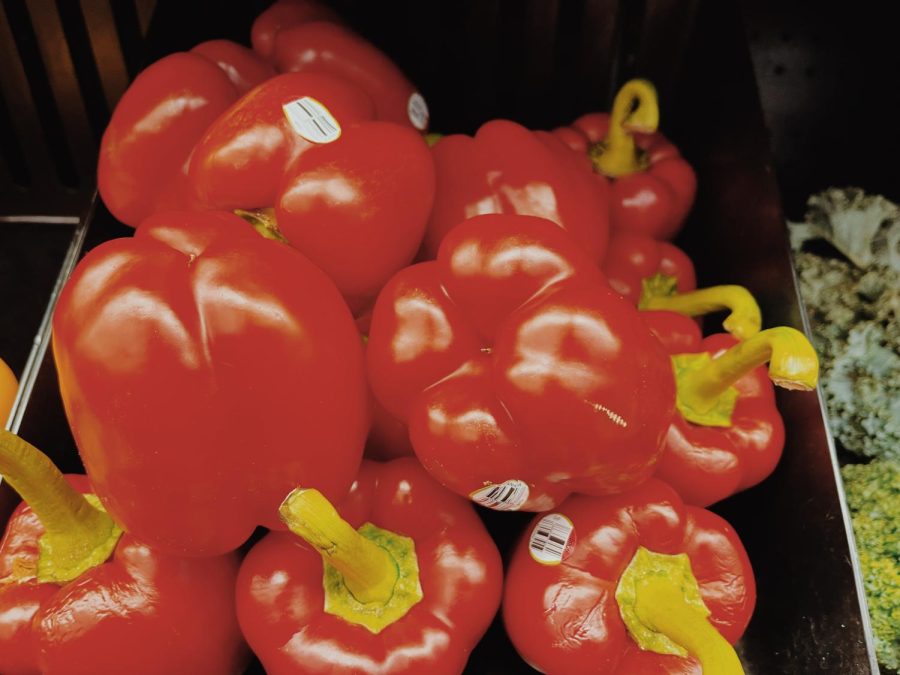Eating Ethically
April 26, 2023
What does it mean to eat ethically? Does it mean avoiding meat products? Does it mean avoiding animal products altogether? Or perhaps it means sourcing your food locally or using products that reduce pollution. There is no avoiding these questions as eating itself is not something we can avoid; we must discuss them.
Let us take the first thing that comes to mind when people talk about the ethics of eating: vegetarianism or veganism. Philosopher Peter Singer argues that animals suffer immensely under the current system. For example, large farms separate mothers and calves within hours of the calves’ birth and pigs and chickens are placed in overcrowded shelters or battery cages in often extremely unsanitary conditions. They are then pumped full of antibiotics to keep them alive (something that endangers humans that eat their meat as the practice increases the risk of antibacterial immunity in certain diseases). In an interview he did with Vogue he said, “Pigs are just as smart and sensitive as dogs are and you can’t really justify loving and petting one while you are sticking your knife and fork into another.” Why do we love and cherish our dogs while raising these other animals in such cruel conditions?
There are, of course, variations on the vegetarian and vegan diets; Singer himself is willing to eat oysters, clams and mussels as he thinks they are incapable of suffering. Other variations may include something along the lines of a pescatarian diet (the only meat eaten is fish). But the core of the arguments is the avoidance of animal suffering.
However, some argue that eating meat itself is a moral duty that reduces animal suffering. Nick Zangwill writes in the Journal of the American Philosophical Association that “the existence of that animal and animals of that kind depends on human beings eating animals of its kind and, hence, that meat-eating practice benefits them.” For example, millions of sheep in New Zealand only exist because humans raise to eat them; they would not survive on their own in the wild. However, he is willing to admit that factory-farmed animals live dismal lives and perhaps consuming them should be avoided and meat-eating should be “part of a past and ongoing practice that benefits animals” which includes giving them a good life before they die. Central to this argument is that some of these animals only exist because of the meat-eating industry and thus, if the industry was in place, they would not exist to have the chance to live these good lives.
Others do not focus on animal suffering but rather on the environmental impact that eating meat (or not eating it) has. It has been estimated that the livestock sector contributes to the largest amount of water pollution because of animal waste and pesticides. It also accounts for a large percentage of human water usage as well as the largest human use of land which in turn is maintained by mass deforestation, climate change, and most other ecological harms. Sir David Attenborough cautioned in an article by The Independent that “the planet cannot support billions of meat-eaters.”
But a question asked in turn is can the planet support billions of plant-eaters? Bjorn Lomborg argues in USA Today that “going vegetarian can help our climate a little bit, but it is an inefficient policy to try to push on people worldwide.” As a vegetarian himself, he thinks avoiding meat might make sense ethically, but sees pushing the diet as impractical for many people as well as helping the environment minimally. He wants people to focus on reducing pollution and focusing on clean energy instead. However, he looks primarily at the individual’s effect of the vegetarian diet rather than the imagined large-scale reduction of the entire meat-eating industry. Another argument made against the vegetarian diet is the idea that some healthy plant-based alternatives and artificially made meat such as Beyond Beef or even just ethically sourced products are unaffordable to poorer communities or, if they are forced to maintain a vegetarian diet due to their poverty, the products they can afford do not have the nutritional value or protein needed to live healthy lives.
How then do we navigate eating ethically? Eating ethically is hard to do, but even harder to do on a budget. However, it is not impossible. Locally sourced food at farmer’s markets or other places and buying seasonal products or meat and eggs from small farmers can help the environment, your own health, and the animals and animal products you may consume. What it means to eat ethically may not have a clear answer, but perhaps the attempt to find out how to do so may be key to this moral puzzle.
Works Cited
Dalton, Jane. “Go Vegetarian to Save Wildlife and the Planet, Sir David Attenborough Urges.” The Independent, 26 Aug. 2020, www.independent.co.uk/climate-change/news/david-attenborough-vegetarian-vegan-meat-life-on-our-planet-netflix-wildlife-earth-a9689816.html.
Lomborg, Bjorn, and USA TODAY. “Don’t Let Vegetarian Environmentalists Shame You for Eating Meat. Science is on Your Side.” USA TODAY, 25 July 2019, www.usatoday.com/story/opinion/voices/2019/07/25/vegetarianism-climate-change-meat-vegan-livestock-column/1804090001/.
Nast, Condé. “Peter Singer Still Doesn’t Want You to Eat Animals.” Vogue, 29 Oct. 2020, www.vogue.com/article/peter-singer-animal-liberation-new-book-why-vegan.
Zangwill, Nick. “Our Moral Duty to Eat Meat.” Journal of the American Philosophical Association, vol. 7, no. 3, 2021, pp. 295–311., doi:10.1017/apa.2020.21.
Kira Symington is a Dakota Student General Reporter. She can be reached at [email protected].


